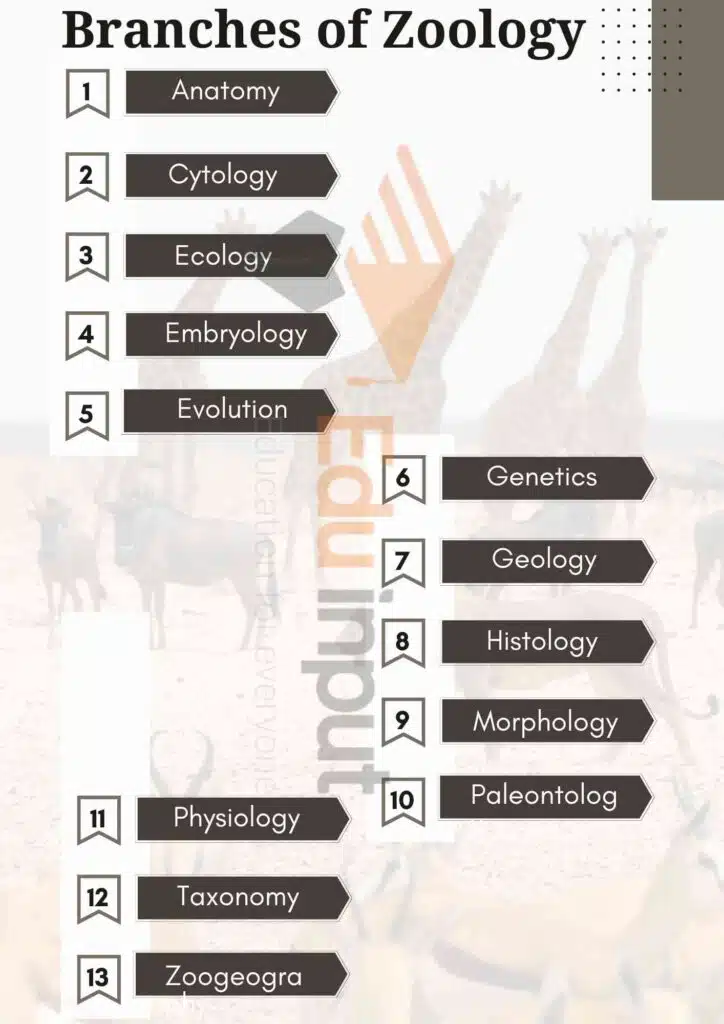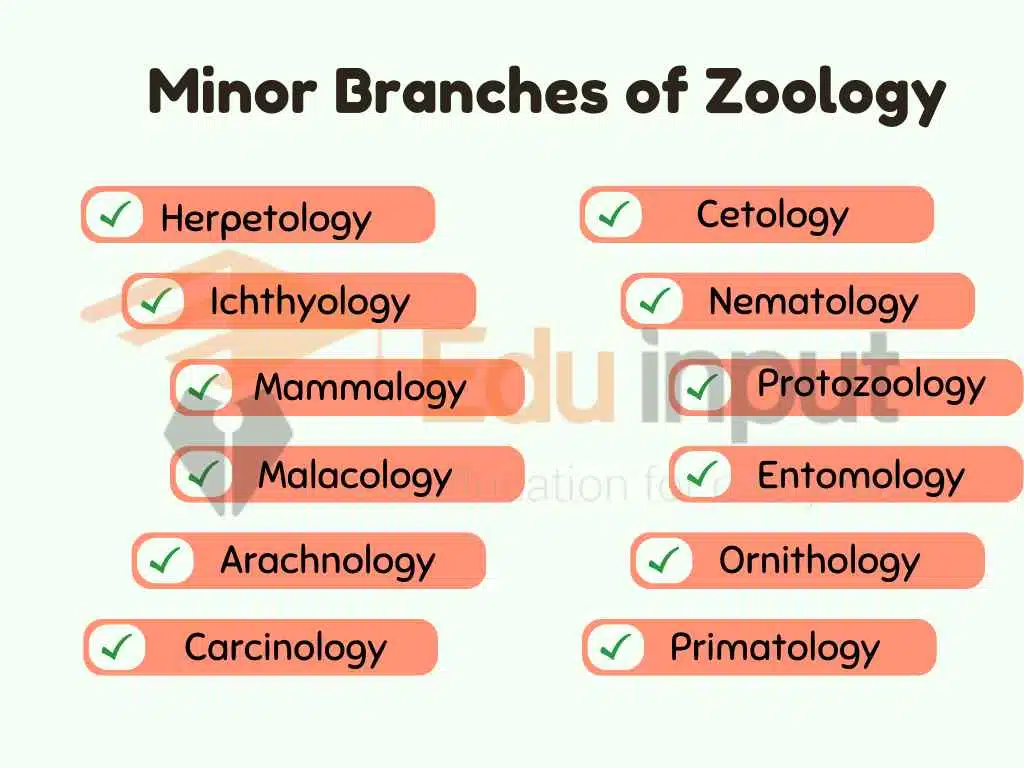Zoology-History, Branches, Scope, Importance, and Applications
Zoology is the branch of Biology that deals with the study of animals and animal kingdoms. It constitutes two Greek words “Zion” meaning ‘Animals’ and logos meaning “the study of”.
All aspects of scientific knowledge about animals, like embryo development, evolution, social behavior, ecological distribution, and classification, are encompassed by zoology.
Zoology is subdivided into different branches based on the characteristics of animals that are being studied.
History of Zoology
Prehistoric man’s survival depended on his ability to hunt, which in turn shaped his relations with other animals.
Animals have been an essential part of human culture since ancient times. We need one another to survive as we are social animals.
The history of zoology shows how the study of the animal kingdom has been organized from ancient to modern times.
In the ancient Greco-Roman world, systematic study of zoology can be found in the works of the two greatest philosophers of the ancient world.
The work of Islamic medicine and scholarship was developed in the Middle Ages by European scholars such as Albertus Magnus.
The European Renaissance and early modern period gave rise to a renewed interest in empiricism and the discovery of novel organisms that changed zoological thought in Europe.
Two figures who were prominent in this movement were Vesalius, an anatomist, and William Harvey, a physiologist. They relied on experimentation and careful observation. In addition, naturalists like Carl Linnaeus and Buffon began to classify the diversity of life and the fossil record.
In Europe during the 16th century, university divisions were founded that focused entirely on animal research. By the mid-17th century, this trend had spread throughout the continent.
After the introduction of the word cell in the 17th century and the observation of the structures throughout the 18th century, the cell was defined as the common structural unit of living things.
In the 19th century, as the microscope became a common place to work for all scientists, thus it became very easy to study organisms at the microscopic level. The development of the natural theory of selection was another innovation in zoology. This theory restructured zoology and taxonomy.
Branches of Zoology
Zoology is the study of animals and their characteristics, Thus it is subdivided into the following branches on the bases of the characteristics that are being studied.

Anatomy
The branch of zoology deals with the identification and description of the internal structure of animals.
Cytology
Cytology is the study of cell structure, its cellular components, and their functions.
Ecology
Ecology is the study of the relationship between living organisms and their ecosystem. It is the study of the behavior in which organisms interact.
Embryology
The study of the features and the process of development of eggs after fertilization. It involves the study of the embryo till birth.
Evolution
Evolution is the study of the origin of animals, their heredity characteristics, and the adaptations they adapt to survive.
Genetics
Genetics involves the study of heredity and all the variations occurring in genes.
Geology
Geology is the study of the solid earth.
Histology
Histology is the anatomical study of biological tissues, their structure, and functions.
Morphology
The study of the shape, size, and structure of all living organisms.
Paleontology
The paleontology is the branch of zoology in which we study fossils, ancient lives, plants, animals, and aquatic animals.
Physiology
Physiology is the study of the organs and their functions in an animal body.
Taxonomy
Taxonomy is the study of the system of naming and classification of animals and other organisms.
Zoogeography
The study of the geographical distribution of animals is called zoogeography.
Minor Branches Of Zoology
Other few smaller branches of zoology include:
- Herpetology (Study of reptiles and amphibians)
- Ichthyology (Study of fishes)
- Mammalogy (Study of mammals)
- Malacology (Study of animals with shells)
- Arachnology (Study of arachnids)
- Carcinology (Study of crustaceans and arthropods)
- Cetology (Study of marine animals)
- Nematology (Study of roundworms)
- Protozoology (Study of protozoa)
- Entomology (Study of insects)
- Neonatology (Study of newborn animals)
- Ornithology (Study of birds)
- Primatology (Study of primates)

What does a Zoologist do?
A zoologist studies animals in and out of captivity. zoologist studies the origins, genetics, diseases, life progression, and behaviors of animals A zoologist’s knowledge is important in preserving habitats.
Zoologists understand how animals act in the wild by observing various species. Their goal is to identify how different species interact. A zoologist designs research projects to study animals. He works to protect wildlife.
Scope of Zoology
Both bachelor’s and master’s candidates can take Zoology courses. In the scope of zoology, we learn about genetics, behavior, and evolution. After B.S., there are a lot of career opportunities for students. Either M.Sc. or even a postgraduate.
Here are the Job opportunities a zoologist can avail of:
1. Animal clinics
2. Environmental agencies
3. Animal behaviorist
4. Animal control officer
5. Animal scientist
6. Wildlife biologist
7. Marine scientist
8. Zoo curator
9. In pharmaceutical companies
10. Conservationist
11. Paleontologists
12. Forensic expert
13. Lab technicians
14. Veterinarians
15. Ecologist
Importance of Zoology
All kinds of animals are studied in zoology. You can gain an understanding of the natural world through the study of zoology, which looks into their biology, how and why behind their environments, and ways to sustain their lives alongside humankind.
Considering ways to face global challenges such as climate change and food security, trying to find solutions to help both animals and humans alike, is one thing that it offers.
Role of Zoology in Food Production: Humans depend on animals for their food. Zoology has helped us to improve the quality and quantity of animals that provide us with food like milk and eggs.
Role of Zoology in Industries: Different substances like honey, wax, and leather are being used in industries. They are extracted from animals. Zoology has made the process easy and helped in their better utilization. These things are now more profitable and cheaper for daily use.
Role of Zoology in Agriculture: Zoology helps in studying and understanding the organisms that benefit or harm crops and cause lower yields. It enables us to control them or to use them in our favor. Due to the Zoology farmers have better understanding of the harmful insects and the insects with positive impact.
Role of Zoology in Medical: Most diseases are caused and transmitted through animals. Zoology plays an important role in medicine in the way that the drugs are initially tested on animals before they are used for human beings. Zoology provides the knowledge of human physiology that has made surgery easy.
Role of Zoology in Genetics: We have a lot of information about our ancestors and evolution. There have been a lot of events related to evolution that were studied under the umbrella of zoology.
The altering of genes of an animal is a way towards a genetic modification. We have an idea of what we need to improve, courtesy of Zoology. We can improve our race by having progenies with great features and characters.
Recent Discoveries in Zoology
- The populations of long-head darter were discovered in Kentucky, New York, North Carolina, Pennsylvania, Tennessee, Virginia, and West Virginia. This specie existed earlier but was not seen in the last 80 years.
- In January 2022, the blanket octopus was discovered by marine biologist Jacinta Shackleton.
- in March 2022, the rose-veiled fairy wrasse was discovered in Maldives (twilight zone).
- In April 2022, ivory-billed woodpeckers were discovered. They were known before 1944 but were officially declared extinct in 2021.
- Researchers from the University of Zurich discovered two families of dolphins that were previously unknown in Switzerland.
- Researchers of the Royal Botanic Gardens in England discovered a genus of water lily, named Victoria boliviana.
Related FAQs
What is Zoology?
Zoology is the branch of biology that deals with the study of animals and animal kingdoms. It constitutes two Greek words “Zion” meaning ‘Animals’ and logos meaning “the study of”.
Is zoology hard to study?
Zoology is very scientific and technical. A good scientific background is required to pursue a degree in Zoology. If you know A-Level or biology, chemistry, and maths, you will find it easier to remember the difficult terms in the course.
Does zoology require math?
Zoologists study the lives of animals, including humans, and use calculus, statistics, and other math for data analysis.
How many years is a zoology degree?
It takes 4-years to earn a bachelor’s degree in Wildlife Conservation, which is the basic level of zoologist education needed to enter the field. Earning a Master’s degree will usually take another 2-years and may call for an additional
Earning a Master’s degree takes usually about 3 years and may require as much as 60 hours of field-specific work.
What jobs can you get with Zoology Degree?
Here are the Job opportunities a zoologist can avail of:
1. Animal clinics
2. Environmental agencies
3. Animal behaviorist
4. Animal control officer
5. Animal scientist
6. Wildlife biologist
7. Marine scientist
8. Zoo curator
9. In pharmaceutical companies
10. Conservationist
11. Paleontologists
12. Forensic expert
13. Lab technicians
14. Veterinarians
15. Ecologist
What does a Zoologist do?
A zoologist studies animals in and out of captivity. zoologist studies the origins, genetics, diseases, life progression, and behaviors of animals A zoologist’s knowledge is important in preserving habitats.
Is zoology a hard major?
Yes, zoology is a hard major. The zoology studies how animals are shaped by their environments and relationships. Students who major in animal biology may go on to conduct field research or pursue higher education in veterinary sciences or medicine after graduation.



Leave a Reply